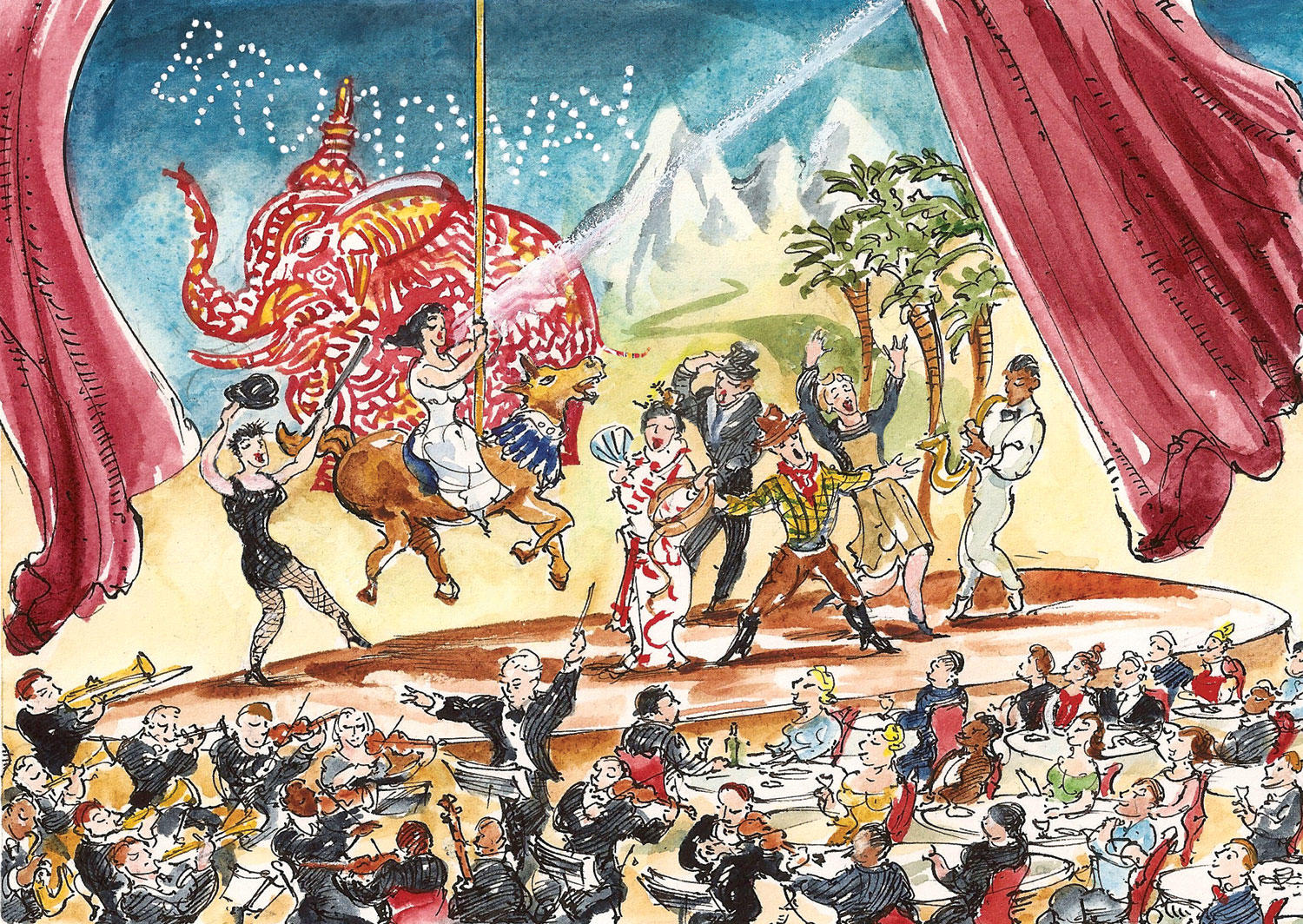It was a rainy Tuesday night in March, the kind of dismal late-winter storm that turns street corners into lagoons and sends unrelenting sheets of stinging water that outmatch even the strongest umbrellas.
But at 54 Below, a Broadway supper club that sits beneath Studio 54, the legendary palace of 1970s disco, the crowd was in high spirits. Spotlights flickered over red-velvet-covered walls as a hundred-odd guests settled into booths and four-top tables, ordering cocktails and french fries, and waving at friends across the room. The lights dimmed, and, behind the piano, Rick Hip-Flores ’02CC struck the first notes of “Bewitched, Bothered, and Bewildered,” by Richard Rodgers ’23CC, ’54HON and Lorenz Hart. After just a few jaunty measures, the message to the weather seemed clear: This is Broadway. There are no rainy days here.
The crowd was gathered for the first annual “Columbia Songbook,” a celebration of show tunes written by faculty and alumni. If that sounds like amateur hour, consider some of the shows that followed the Great White Way down from Morningside Heights: Pal Joey (Rodgers and Hart); Oklahoma!, Carousel, South Pacific, The King and I, The Sound of Music (Rodgers and Oscar Hammerstein II ’16CC); Cabaret, Chicago, Fosse (John Kander ’54GSAS and Fred Ebb ’57GSAS); M. Butterfly (playwriting professor David Henry Hwang); and Next to Normal (Tom Kitt ’96CC and Brian Yorkey ’93CC), to name just a few. Without Columbia composers and lyricists, we would never have heard Ella Fitzgerald sing “My Funny Valentine” or Julie Andrews list her favorite things. No one would know the joy of Chita Rivera’s snapping fingers in All That Jazz or Frank Sinatra’s signature song, “New York, New York.”
In short, says Danielle Gautier, who conceived of and produced the show, “There was an embarrassment of riches. Picking the song list was a humbling exercise.”
For Gautier, it also required a crash course in Columbia’s musical-theater history. The idea of uniting the greatest hits of Columbia show tunes in one performance had been floating around the theater department for years, but Gautier, who is a first-year student in the School of the Arts’ theater management and producing program, had been on campus for less than a month when she started working on it.
“It really just started with the requirement,” she says. “All MFA students have to produce or manage something using Columbia talent. Most people work on a campus show, but I really wanted to do something that incorporated the whole Columbia community.”
Gautier teamed up with musical director Hip-Flores, a conductor on the US tour of We Will Rock You, and director Laura Pietropinto ’00CC, who was the assistant director of Next to Normal.
Most of the night’s performers, too, were Columbians, starting with Donna Vivino ’00BC, better known to some as the green-skinned witch Elphaba in the national tour of Wicked. Several were MFA candidates in musical theater; still others were recent alums just getting their start in the business. Between songs, they gathered together at the bar, blowing good-luck kisses to each other and whistling loudly after solos.
“I was hoping that it would have that kind of reunion vibe,” Gautier says. “Everyone involved has been through so many of the same experiences at Columbia.”
Richard Rodgers often said that he came to Columbia specifically because he hoped it would give him the kind of experience that would prepare him for a career on Broadway. As he wrote in his 1975 autobiography: “There were experienced directors, a beautifully equipped stage with good lighting situated in the heart of the Broadway theatre district, and best of all, professional musicians in the pit. Here, certainly, were near-ideal working conditions; here, possibly, was an opportunity that could be of incalculable help in furthering my career.” Forty years later, looking out from behind his piano, Tom Kitt echoed that very sentiment: “When I was a senior, I was deciding whether to take a job in finance,” he said with a visible shudder, “or to do what I really loved. It was a big decision, but being at Columbia, and working on the Varsity Show, made it easy.”
He started to play the finale from the 1996 Varsity Show, Devil in a Light Blue Dress, about a bunch of graduating seniors who decide not to sell their souls. Some might have been surprised that he didn’t pick something from Next to Normal, the show that won him his Pulitzer and made him famous. But on this rainy, wonderful night, it wasn’t about that show — it was about the place that made it all possible.



